
Phytopathology Research
Scope & Guideline
Fostering inclusive research in the realm of phytopathology.
Introduction
Aims and Scopes
- Molecular Pathogenesis:
The journal consistently publishes research on the molecular mechanisms of pathogenesis in various plant pathogens, including fungi, bacteria, and viruses. This includes studies on gene expression, effector proteins, and host-pathogen interactions. - Plant Immunity and Resistance Mechanisms:
Research related to plant defense mechanisms, including the identification of resistance genes, signaling pathways, and the role of various plant hormones in immune responses, forms a significant part of the journal's scope. - Biocontrol and Disease Management Strategies:
Phytopathology Research includes studies on innovative biocontrol methods and integrated disease management strategies, highlighting the use of biological agents, resistance inducers, and environmentally friendly practices. - Genetic and Genomic Approaches:
The journal emphasizes genetic and genomic studies that explore the genetic diversity of pathogens and plants, as well as the application of genomic technologies for the identification of disease resistance traits. - Epidemiology and Disease Spread:
A focus on the epidemiology of plant diseases, including the study of pathogen distribution, transmission dynamics, and environmental factors influencing disease outbreaks, is a recurring theme in the journal.
Trending and Emerging
- Host-Pathogen Interaction Mechanisms:
Recent publications increasingly focus on the molecular and cellular mechanisms of host-pathogen interactions, particularly how pathogens manipulate host cellular processes to establish infection. - CRISPR and Gene Editing Applications:
There is a growing interest in the use of CRISPR and other gene editing technologies for developing disease-resistant plant varieties, indicating a trend towards genetic engineering as a viable strategy for crop protection. - Nanotechnology in Plant Pathology:
Emerging research on the application of nanotechnology, such as nanoparticle-based treatments for disease control, is gaining traction as a novel approach to enhance plant immunity and pathogen management. - Plant-Microbe Interactions:
Studies exploring the beneficial roles of plant-associated microbes, including endophytes and rhizobacteria, in enhancing plant health and resistance to diseases are increasingly prevalent. - Epidemiological Modeling and Predictive Analytics:
The integration of data science and predictive modeling to forecast disease outbreaks and develop management strategies is becoming a key focus area, reflecting advancements in technology and data analysis in plant pathology.
Declining or Waning
- Traditional Chemical Control Methods:
Research focused on conventional chemical fungicides and pesticides is becoming less prevalent, possibly due to the increasing emphasis on sustainable and integrated pest management strategies. - Single Pathogen Studies:
While studies on individual pathogens are still relevant, there is a noticeable shift towards more integrative approaches that consider multi-pathogen interactions and their collective impact on plant health. - Historical Perspectives on Plant Diseases:
Papers that primarily focus on historical accounts or reviews of past plant disease outbreaks are appearing less frequently, suggesting a move towards contemporary issues and future directions in phytopathology. - Basic Morphological Studies:
Research that emphasizes basic morphological characteristics of pathogens without linking them to functional implications in pathogenesis or disease management is becoming less common. - Invasive Species Impact Studies:
While important, research specifically focused on the impact of invasive plant pathogens has decreased, as the field shifts towards addressing broader ecological and agricultural implications.
Similar Journals

aBIOTECH
Transforming ideas into groundbreaking solutions in life sciences.aBIOTECH, published by SPRINGERNATURE, is a premier academic journal dedicated to advancing the fields of biotechnology, agronomy, and molecular biology. With an impressive ISSN of 2096-6326 and E-ISSN 2662-1738, this journal has established itself as a vital resource for researchers and professionals aiming to publish high-quality, impactful studies. Based in Singapore, aBIOTECH has achieved remarkable recognition, boasting a Q1 ranking in multiple categories including Agronomy and Crop Science, Biochemistry, and Genetics in the 2023 Scopus rankings. Its solid position in the 90th percentile for Biochemistry and Genetics reinforces its significance within the global scientific community. The journal covers a broad spectrum of topics relevant to both basic and applied research, facilitating a shared dialogue amongst scientists and encouraging collaborative progress in innovative biotechnological applications. The open-access nature of the journal ensures that cutting-edge research is freely available, fostering a global exchange of ideas that is critical to the advancement of science today.

Vavilovskii Zhurnal Genetiki i Selektsii
Unlocking Innovations in Agricultural and Biological SciencesVavilovskii Zhurnal Genetiki i Selektsii, with ISSN 2500-0462 and E-ISSN 2500-3259, is a distinguished open-access journal published by the Russian Academy of Sciences, Institute of Cytology and Genetics. Since transitioning to open access in 2013, the journal has been dedicated to advancing research and discourse in the fields of genetics and selection, particularly within agricultural and biological sciences. With a current ranking of Q2 in Agricultural and Biological Sciences and Q3 in Biochemistry, Genetics and Molecular Biology according to Scopus, it serves as a pivotal platform for researchers, professionals, and students to disseminate their findings and collaborate on innovative ideas. The journal, housed in the vibrant academic environment of Novosibirsk, Russia, publishes a diverse range of articles that contribute to the ongoing evolution of genetic studies and practical applications in agriculture. Its commitment to quality and accessibility ensures it plays an essential role in the global scientific community, fostering knowledge that bridges theoretical research and practical implementation.
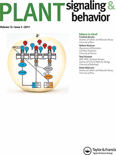
Plant Signaling & Behavior
Decoding Nature's Signals: Where Plants SpeakPlant Signaling & Behavior is a prestigious journal published by TAYLOR & FRANCIS INC, dedicated to advancing the understanding of the complex signaling mechanisms and behavioral responses of plants. With an ISSN of 1559-2316 and an E-ISSN of 1559-2324, it has firmly established itself in the field of Plant Science, earning a Q1 ranking in the 2023 category quartiles and ranking #83 out of 516 in Agricultural and Biological Sciences, placing it in the 84th percentile according to Scopus metrics. The journal serves as a vital platform for researchers and professionals looking to publish innovative studies and reviews that explore the intricate relationships between plant behavior and environmental signaling. With coverage spanning from 2006 to 2024, Plant Signaling & Behavior not only enhances academic discourse but also supports the growing interdisciplinary nature of plant sciences. Although the journal is not open access, it remains a significant resource for students, researchers, and practitioners aiming to deepen their understanding of plant signaling and its implications for ecology and agricultural practices.
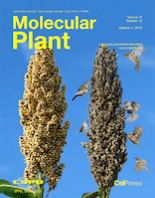
Molecular Plant
Advancing plant science through molecular insights.Molecular Plant, published by CELL PRESS, is a premier journal dedicated to advancing the field of molecular biology and plant science. With an impressive impact factor reflecting its rigorous peer-review process and the high quality of its published research, this journal has achieved a remarkable Q1 ranking in both Molecular Biology and Plant Science categories as of 2023. Its Scopus rankings place it within the top echelons of its field, holding 2nd place in Agricultural and Biological Sciences - Plant Science, showcasing its vital role in disseminating impactful research. The journal covers a broad range of topics, including but not limited to, plant genetics, molecular interactions, and biotechnological advances. Research published in Molecular Plant has the potential to significantly influence agricultural practices and biotechnological applications, making it an essential resource for researchers, professionals, and students eager to stay at the forefront of plant research. Access options for the journal are tailored to accommodate a wide audience, facilitating engagement with cutting-edge findings and breakthroughs. As the field of plant science continues to evolve, Molecular Plant remains integral to fostering innovation and collaboration within the scientific community.
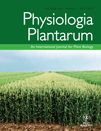
PHYSIOLOGIA PLANTARUM
Connecting Researchers to the Frontiers of Plant SciencePHYSIOLOGIA PLANTARUM, published by WILEY, is a prestigious journal in the fields of plant science, physiology, and genetics, known for its impactful contributions since its inception in 1948. With an impressive impact factor and a consistent ranking in the Q1 and Q2 quartiles, it stands out in critical disciplines such as cell biology and biochemistry, ranking #24 in Plant Science with a remarkable 95th percentile standing. This journal primarily serves researchers and professionals committed to advancing the understanding of plant functions, responses, and their molecular mechanisms. Its broad scope allows for a diverse array of studies, ensuring that groundbreaking research is accessible to the global scientific community. Although it does not offer Open Access, PHYSIOLOGIA PLANTARUM remains a vital resource for scholars looking to stay at the forefront of plant biology and related fields.

EUROPEAN JOURNAL OF PLANT PATHOLOGY
Advancing plant health through innovative research.The EUROPEAN JOURNAL OF PLANT PATHOLOGY, published by SPRINGER, is a leading academic journal dedicated to advancing the understanding of plant pathology within the fields of Agronomy, Horticulture, and Plant Science. With an ISSN of 0929-1873 and an E-ISSN of 1573-8469, this journal has established its presence since its inception in 1994 and continues to serve as an essential resource for researchers, professionals, and students through 2024. The journal is ranked in the Q2 category in multiple scholarly domains and boasts impressive Scopus rankings, placing it in the 80th percentile for Horticulture and 69th percentile for Plant Science. Notably, it facilitates the dissemination of cutting-edge research and reviews that address critical challenges in plant health, disease management, and sustainable agricultural practices. Although the journal is not Open Access, it provides vital insights and contributes significantly to the scientific community, fostering collaboration and innovation in plant pathology.
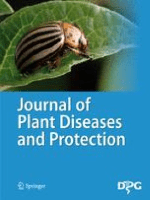
Journal of Plant Diseases and Protection
Advancing the Science of Plant HealthThe Journal of Plant Diseases and Protection, published by SPRINGER HEIDELBERG in Germany, is a premier platform for the dissemination of cutting-edge research in the fields of Agronomy, Horticulture, and Plant Science. With its Q2 ranking in multiple categories as of 2023, this journal stands out in the academic landscape, highlighting its strong performance with a notable Scopus rank of 22nd in Horticulture and placing in the top percentile for Agronomy and Plant Science. The journal spans from 2006 to 2024, making it a valuable resource for researchers, professionals, and students seeking to stay abreast of advancements in the understanding of plant diseases and their protection. The Open Access options further enhance its accessibility, fostering a global exchange of knowledge essential for addressing contemporary agricultural challenges.
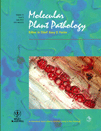
MOLECULAR PLANT PATHOLOGY
Unlocking the secrets of plant resilience.MOLECULAR PLANT PATHOLOGY, published by Wiley, is a leading academic journal in the fields of Agronomy, Molecular Biology, Plant Science, and Soil Science, with a strong reputation underscored by its impressive Q1 rankings across multiple categories and a Scopus rank placing it in the top echelons of its fields. Since embracing Open Access in 2019, this journal has significantly broadened its reach, enhancing visibility and accessibility for researchers, professionals, and students alike. With a commitment to publishing high-quality, innovative research, MOLECULAR PLANT PATHOLOGY serves as a critical platform for advancing our understanding of plant diseases and pathogenesis, contributing to the development of sustainable agricultural practices. As a vital resource for scholarly communication, it fosters collaboration among scientists and supports the sharing of vital knowledge that addresses issues of global food security and environmental health.

Tropical Plant Biology
Cultivating Insights into Tropical EcosystemsTropical Plant Biology is a premier academic journal published by Springer, dedicated to advancing the understanding of tropical plants and their ecological significance. With an ISSN of 1935-9756 and an E-ISSN of 1935-9764, this journal serves as a vital platform for researchers, professionals, and students focused on the fields of Genetics and Plant Science. Notably recognized in 2023 as a Q2 journal in Plant Science and Q3 in Genetics, it ranks 171st out of 516 in Agricultural and Biological Sciences and 227th out of 347 in Genetics according to Scopus. The journal encompasses a diverse range of topics, offering insights into tropical plant biology, ecology, conservation, and biodiversity. Although it does not currently operate under an open-access model, it remains an essential resource for anyone passionate about tropical ecosystems and their intricate relationships. With contributions spanning from 2009 to 2024, Tropical Plant Biology continues to foster scholarly discourse and innovation in the field.

Current Plant Biology
Fostering Collaboration in Plant ResearchCurrent Plant Biology is a distinguished peer-reviewed journal published by ELSEVIER, focusing on the dynamic and rapidly evolving field of plant sciences. Since its inception as an Open Access publication in 2014, it has established itself as a leading platform for innovative research, boasting a remarkable Impact Factor that underscores its relevance and contribution to the scientific community. Based in the Netherlands, this journal caters to a diverse audience of researchers, professionals, and students, facilitating the dissemination of key findings in an array of disciplines including biochemistry, genetics, cell biology, and developmental biology. Recognized for its rigorous standards, Current Plant Biology holds a prestigious standing, classified within the Q1 and Q2 quartiles of various Scopus categories, reflecting its impact and reputation in the realms of Plant Science and related fields. The journal is committed to providing accessible and high-quality research outputs that inspire further investigation and collaboration in plant biology.